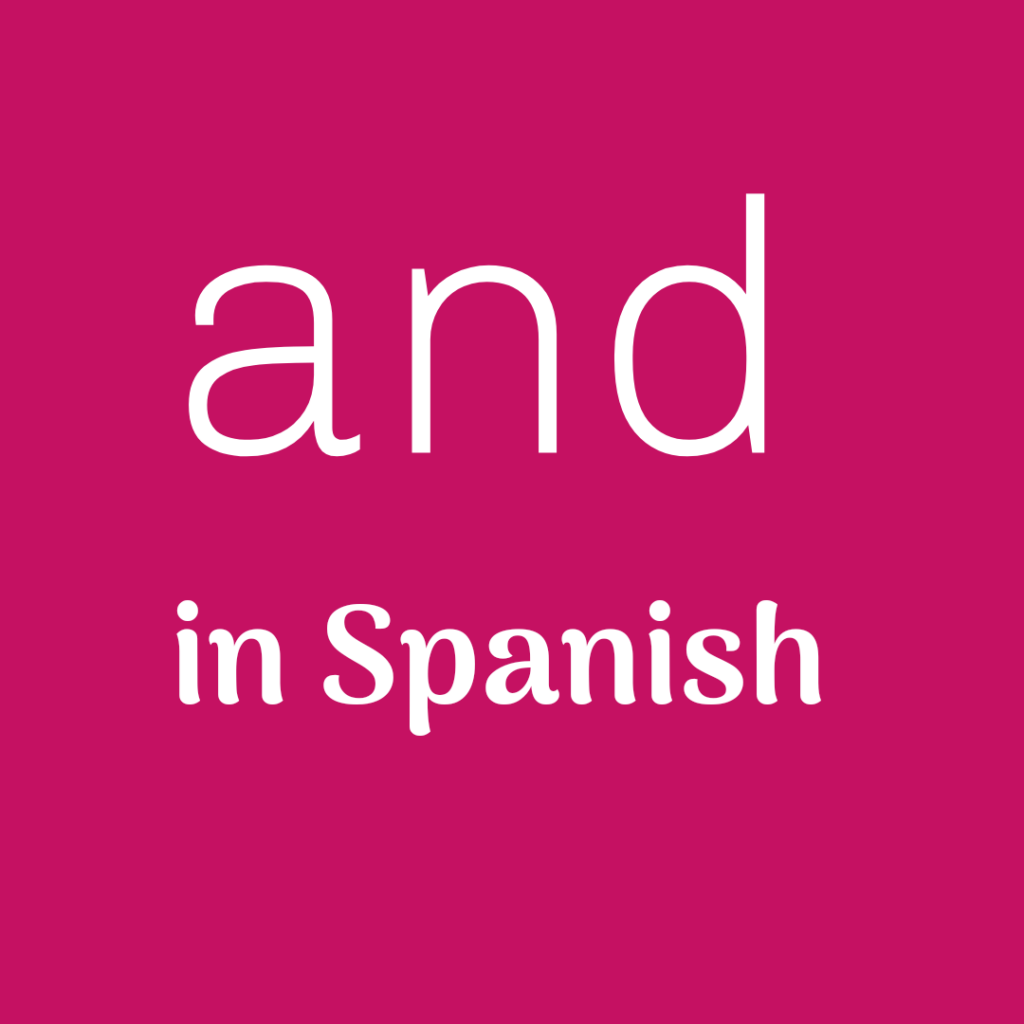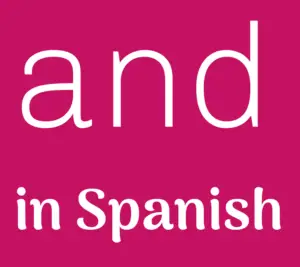
How to say and in Spanish?
¿Cómo se dice and en español? And in Spanish translation: y.
and – y
‘And’ is used to join or group words or sentences, it is also used as reinforcement or emphasis located at the beginning of a clause or period without a link to any previous word.
Conversation:
Luisa: Marcos trae manzanas y peras | Marcos brings apples and pears
Marcos: Está bien | OK
‘And’ is used to join or group words or sentences:
| Una casa moderna y confortable. | – | A modern and comfortable house. |
| Juan y mi hermano Pedro salieron de viaje. | – | Juan and my brother Pedro went on a trip. |
| Nevaba y hacía frío de verdad. | – | It was snowing and it was really cold. |
| Han pasado días y días. | – | Days and days have passed. |
| Se lo explicaré una y otra vez. | – | I will explain it to you over and over again. |
| Esas frutas tienen hierro y vitaminas. | – | Those fruits have iron and vitamins. |
| No puedo terminar el trabajo y qué va a pasar. | – | I can’t finish the job and what will happen. |
| No te compliques y relájate un rato más. | – | Do not complicate yourself and relax a little more. |
| Por favor, ten paciencia y espera un poco más. | – | Please be patient and wait a little longer. |
| Recuerda no te apures y se prudente. | – | Remember not to rush and be careful. |
| Mira a ver y anda tranquilo. | – | Take a look and be quiet. |
| Ella es encantadora y recuerdo que nos conocimos en la fiesta. | – | She is lovely and I remember that we met at the party. |
| Espérame y en unos segundos estoy contigo. | – | Wait for me and in a few seconds I’ll be with you. |
| Laura y María se van de paseo el domingo próximo. | – | Laura and María are going for a walk next Sunday. |
| No te amilanes y sé fuerte ante los obstáculos. | – | Do not be intimidated and be strong in the face of obstacles. |
| La profesora de Historia le visitaron la clase y salió excelente. | – | The history teacher visited her class and she came out excellent. |
| Eres muy osado y valiente. | – | You are very brave and brave. |
| Pero y qué equivocación más rara. | – | But what a weird mistake. |
| Me gusta el rojo y el azul. | – | I like red and blue. |
| Ella es alta y bonita. | – | She is tall and pretty. |
| Estamos almorzando y hablando. | – | We are having lunch and talking. |
| Luego pasamos por tu casa y la mía. | – | Then we stop by your house and mine. |
| Tú y yo por siempre. | – | You and me forever. |
| Mi madre y yo somos amigas. | – | My mother and I are friends. |
| Compramos ropas y zapatos. | – | We buy clothes and shoes. |
| Tu computadora portátil y tu celular están aquí. | – | Your laptop and cell phone are here. |
| Recojo y limpio. | – | I collect and clean. |
‘And’ is used as reinforcement or emphasis located at the beginning of a clause:
| ¡Y qué cara más sucia tiene! | – | And what a dirty face he has! |
| ¿Y tú hermano? | – | And your brother? |
| Carlos, ¿t tú coche? | – | Carlos, do you have a car? |
| Oye, ¿y qué pasa si no lo hago? | – | Hey, what if I don’t? |
| Y yo ya estaba en la estación. | – | And I was already at the station. |
| Y ya tengo la sustituta de Patricia en las labores de limpieza de la cafétería. | – | And I already have Patricia’s substitute in the caféteria cleaning tasks. |
| Mami, y es que no tengo hambre todavía. | – | Mommy, and I’m not hungry yet. |
| Y ya yo soy el presidente de la República. | – | And now I am the President of the Republic. |
| Y habla varios idiomas. | – | And he speaks several languages. |
| Nancy, y ya tú no quieres venir a la casa. | – | Nancy, and you don’t want to come to the house anymore. |
| Y ya le llegará a él su turno. | – | And it will be his turn. |
| Y para cuándo vienes de manera definitiva. | – | And when are you coming permanently? |
| Pero y qué equivocación más rara. | – | But what a weird mistake. |
| Y tú también vas? | – | And are you going too? |
| ¿Y cuándo termina? | – | And when it ends? |
| Luis, ¿y dónde estás? | – | Louis, where are you? |
